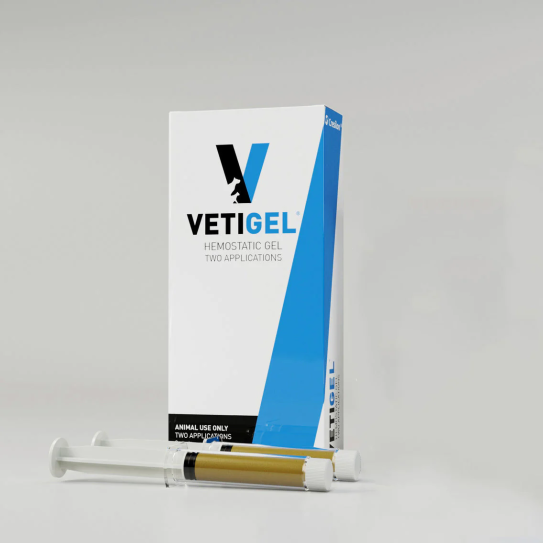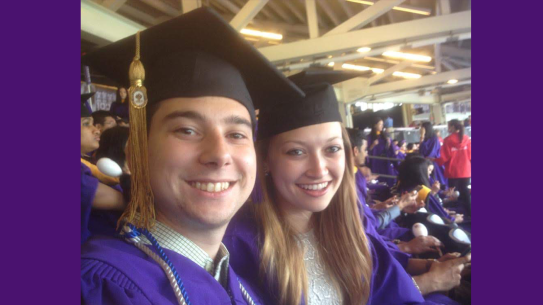Cresilon
-
A safe, effective, and reliable plant-based solution to stop bleeding

The Team:
Joe Landolina and Isaac Miller
The Story:
When Joe Landolina was invited to give a TEDx talk in Madrid, Spain, in 2014, he proved himself to be a riveting speaker. “Imagine you’re a soldier on the battlefield,” he told his rapt audience, painting a terrifying picture of a GI whose femoral artery has been severed badly enough to kill him within three minutes. The products already on the market work — but only within five minutes — too late for a person suffering an injury this severe. On the other hand, Landolina’s innovative technology stopped bleeding within seconds, thanks to its ability to activate three methods of hemostasis simultaneously: holding in its own pressure, activating the body’s platelets, and forming a fibrin clot, all on the wound surface.
Landolina received frequent requests from journalists and event organizers not just because the technology he developed had the potential to save countless lives, but because the story of that development was so compelling.
Like Rick Rubin, who had founded Def-Jam Records from his Washington Square dorm, Landolina had launched his company, then called Suneris, from his room in Othmer Hall. Then just a first-year student, he discovered a way to mimic the extracellular matrix (ECM), which lends structure to tissues and organs in the body, using polymers from the cell walls of algae. (He had something of a head start: Landolina’s family owned a winery, and by the time he arrived at Tandon, he had already spent countless hours conducting chemical experiments with grapes and other plants.) In gel form, the new material was able to solidify and meld platelets together to close wounds and halt bleeding almost instantaneously.
In 2011 he joined forces with Isaac Miller, a finance and management student from Stern, to pitch the concept at the school’s Inno/Vention competition, and their triumph at that hotly contested annual event was just the beginning. By the time Landolina had graduated in 2014 with combined bachelor’s and master’s degrees in chemical engineering, the company, now called Cresilon, was firmly launched. Its initial product, VETIGEL®, was aimed at the veterinary market, and after that proved to be an unmitigated success, Cresilon set its sights on gaining FDA approval for human use.
Among the interim steps was signing a cooperative research-and-development agreement with the Department of Defense to investigate use of the gel technology to treat traumatic brain injuries sustained on the battlefield, and in late 2022, the company secured $25 million in a Series A-4 financing round.
Those funds were earmarked for accelerating a global expansion plan, increasing production capacity at the state-of-the-art bio-manufacturing facility they had built in Brooklyn, and supporting entry into the human health market — plans that came to fruition in mid-2023, when Cresilon Hemostatic Gel™ (CHG™) was granted clearance from the FDA for human use in managing bleeding wounds such as minor cuts, lacerations, and abrasions.
On August 15, 2024, the company announced that it had received an additional FDA clearance, this one for its TRAUMAGEL® product, which controls moderate to severe bleeding. Cresilon intends to develop and manufacture TRAUMAGEL to address the needs of the U.S. military, government health agencies, emergency medical services, systems, and medical professionals who routinely encounter traumatic wounds and need a solution to quickly and effectively stop and control severe bleeding.
“The ability to rapidly stop bleeding at the point of care and halt a life-threatening hemorrhage can be the difference between life and death for people with traumatic injuries,” Landolina, who was named an Empire BlueCross BlueShield 2024 Whole Health Hero, said. “The FDA clearance for TRAUMAGEL is a monumental milestone for Cresilon and brings us another step forward in our mission to save lives and transform the standard of care in emergency medicine. Our proprietary hemostatic gel technology is a game-changer and unlike any other hemostatic agent currently being used.”
Landolina and Cresilon — which was included on the 2024 list of Fast Company’s most innovative companies, landing in the top spot in the medical device category — have come a long way since those days in Othmer Hall, but the mission has remained the same: Saving lives by improving wound care and advancing the standard of its medical treatment.
That mission is being carried out right here in Brooklyn. "When I created this revolutionary technology at 17 years of age, I was a student at NYU with a deep passion and mission to save lives, and as a lifelong New Yorker I was spurred by a feeling of responsibility to ensure innovation and entrepreneurial pursuits could thrive in my hometown,” Landolina explains. “As such, we have built the only biomanufacturing facility of its kind in all of the five boroughs and we are creating jobs, economic, engineering, and med tech opportunities vital for New York City."


